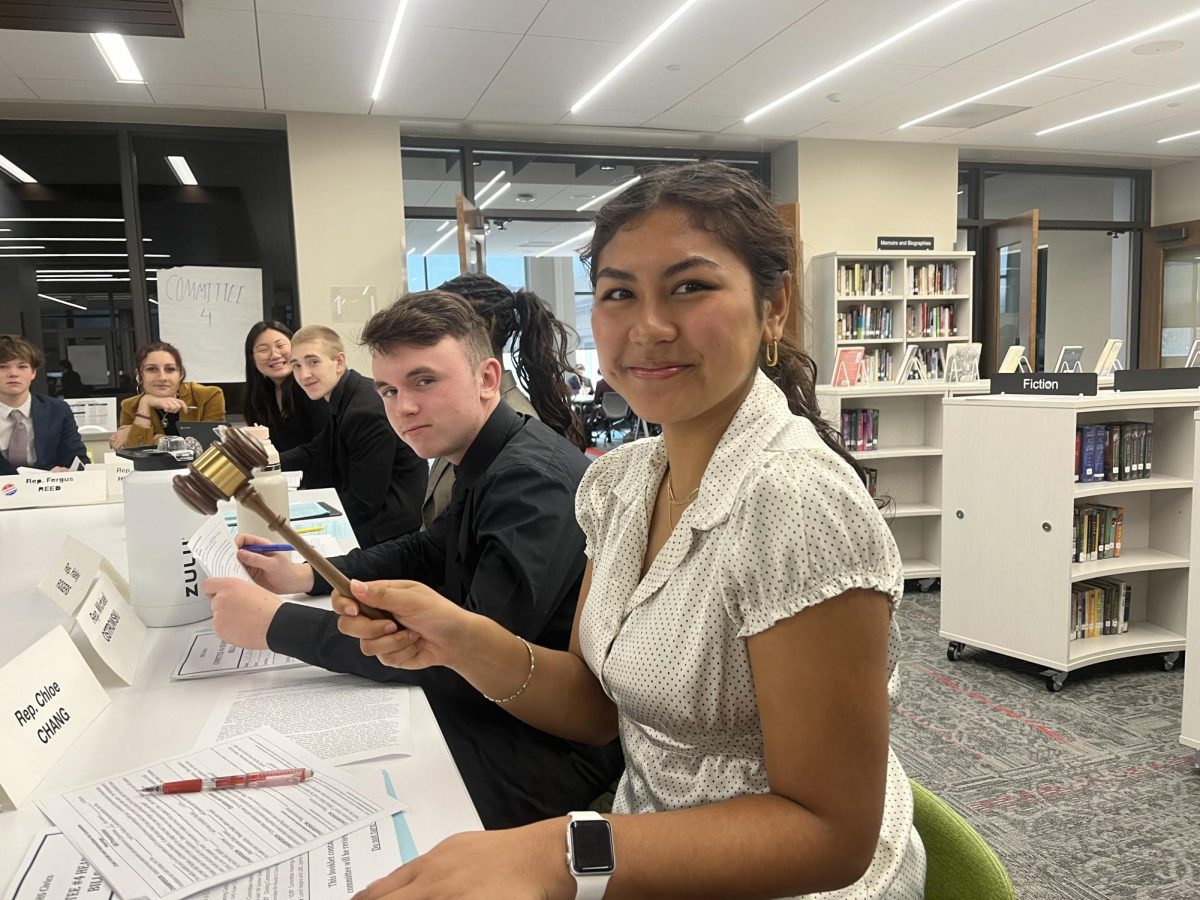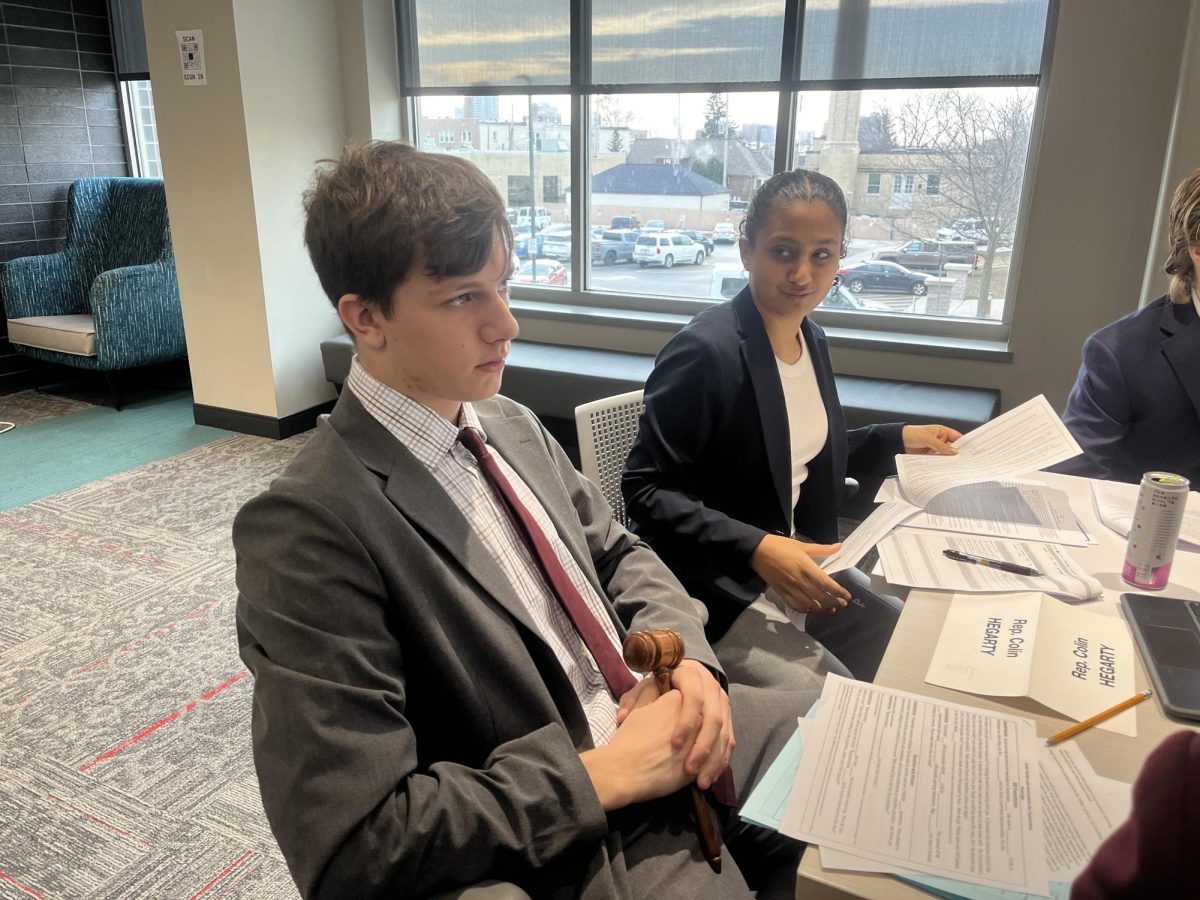On December 4, Civics students experienced a real-life simulation of the legislative process through their first hearing of the year. Students had the opportunity to prepare, propose, and debate bills regarding a variety of topics while practicing proper parliamentary procedure and dressing in Western Business Attire.
While this event was new to this year’s Civics students, Jesse Perez, social studies teacher, says their prior classes had prepared them well.
“Civics is a class that merges government and public speaking and civil discourse together,” Perez said. “Throughout the class, students learn a little bit about history. They learn about their government and then they go into a simulation where they are members of our government and they get to actually help create laws or bills that hopefully become laws later.”
In order to construct these bills, students chose topics that interested them at the beginning of the year. They then spent four weeks researching and preparing their chosen bills before presenting them to a committee group of 14 to 15 people who debated each proposal.
“[In summary], the Civics hearing was [us] debating the bills that each of us created,” said Zoe Townsend, junior and Civics student. “You do a bunch of research about the bill that you’re creating or want to create, and that was what the hearing was about: debating those bills and which should be passed and which should be failed.”
During the preparation process students collaborated in groups to draft speeches, essays, and the final bills.
“They have to go through a process of peer revision, and everybody takes a different section of the bill and they all write it,” Perez said, “Then students must present their bill with a five minute speech and a 10-minute question time.”
Townsend’s bill was focused on banning social media for children under the age of 12. Though it didn’t pass, there is a chance that it and other failed bills could be revisited for the next hearing.
Various other topics were also debated during the hearing.
“There was a bill about biomedical research that was passed,” Perez said. “There was a bill about health care that actually failed, [which was] a free healthcare bill. There was a bill to restore Roe v. Wade, [and] that bill ended up passing. There was also a bill about lowering the drinking age to 18, which ended up passing. There was [also] a really interesting bill about making rental cars and hotels able to be rented by somebody who’s 18 years old.”
The creative freedom in this project helped engage students and made the experience memorable.
“My favorite part of the hearings was just hearing everyone’s ideas,” Townsend said. “There were some interesting ideas in there, and some of them actually got passed.”
Students also had the opportunity to take on leadership positions within the hearing. Students were elected to positions by their peers, who considered each other’s strengths and weaknesses during appointment.
“[The election process] is very difficult, and that’s done by a group called the Rules Committee,” Perez said. “These are members from each class who are elected by their classmates. Students who are really good at paying attention to conversations — but maybe who are a little bit less apt to participate — might be given the job of a clerk. The committee chairs are people who are selected by the Rules Committee from each class, and they have to be somebody who is, one: able to take charge of a group, and two: able to keep conversations going.”
There are 12 committee chairs in total, two for each of the six committees.
In previous legislative semesters, the hearings have included guest speakers who Perez says have enhanced the experience.
“We have reached out to a few guest speakers this year,” Perez said. “As of right now, we haven’t confirmed anyone, but we have reached out to a ton of Wisconsin lawmakers. In previous years, we had Mandela Barnes and [the] Village President come speak, as well as Darren Madison, who came to speak last year and has been a two-time speaker. I’m hoping he comes back because the kids really love him.”
The second part of the hearings will take place either December 16 or 17.
“The next hearing will be a full session, which is a full day,” Townsend said. “We have prepared for these hearings for almost four weeks, so it’s cool to present something you have been doing so much research on.”
This experience offers learning for both students and Perez, who says he has learned a lot from organizing this process.
“I think this benefits students a lot because [the legislative system] is one of the big things in life and it’s something that I am super passionate about,” Perez said. “It’s super important to learn about history and how our government works because it’s going to be so prevalent in these students’ lives shortly after high school. I also found it really impressive how students were able to change others’ minds on their topics; that’s a skill that transcends class and can be really vital in their future.”
Through teaching Civics, Perez has learned to relinquish some control over the process, allowing students, especially those in the Rules Committee, to take on more responsibility.
“As the [teacher], you have all the power, but now the students have the power, so it’s something that’s amazing, because it takes a lot of work off of my shoulders, but also it’s uncomfortable because you don’t know how things are going to work out,” Perez said.
For some students, the hearing was their first exposure to the legislative system. Many found this opportunity enjoyable and valuable.
“It was really interesting hearing the bills and just experiencing what goes on in real life,” Townsend said. “It’s fun to do something that you know will be useful in the future. I’m excited to do it again.”


